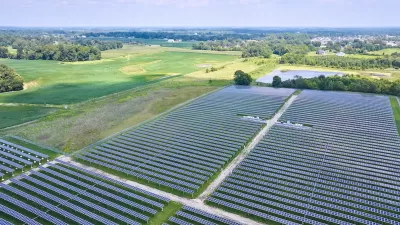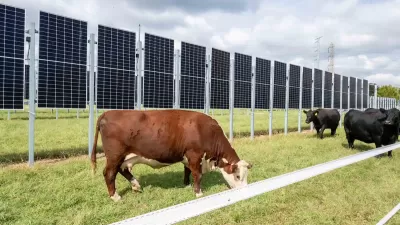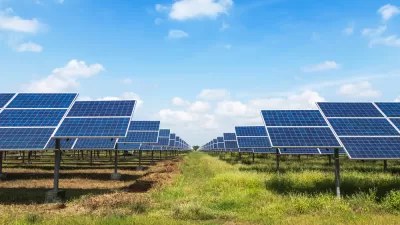Despite concerns that solar projects could lower property values, new research finds they actually rose slightly in areas near utility-scale solar installations.

Large solar farms do not have a negative impact on nearby property values in the Midwest, reveals a study from a Loyola University researcher. As Kari Lydersen notes in an article for Canary Media, they may even have a slight positive effect.
The study found that property values near 70 large-scale solar farms in the Midwest actually increased by 0.5 percent to 2 percent. The researcher, Gilbert Michaud, noted that the installations can also drive local economic development through new jobs and tax contributions. “The most beneficial impact on property values was from solar farms between 5 and 20 MW in size, perhaps in part because these can be hidden by vegetative buffers.”
The study was a response to concerns by many residents in rural areas that solar projects will reduce property values and have a negative impact on local communities. Michaud hopes local officials will take note, saying, “Many of these folks are now making decisions about whether to host a large-scale solar project in their community, and the potential impacts to property values is often something that comes up in local debates and at local hearings. Data can help tell a story and move the debate beyond anecdotal or subjective arguments.”
FULL STORY: Solar farms don’t hurt nearby property values, new research finds

Planetizen Federal Action Tracker
A weekly monitor of how Trump’s orders and actions are impacting planners and planning in America.

Congressman Proposes Bill to Rename DC Metro “Trump Train”
The Make Autorail Great Again Act would withhold federal funding to the system until the Washington Metropolitan Area Transit Authority (WMATA), rebrands as the Washington Metropolitan Authority for Greater Access (WMAGA).

The Simple Legislative Tool Transforming Vacant Downtowns
In California, Michigan and Georgia, an easy win is bringing dollars — and delight — back to city centers.

Albuquerque’s Microtransit: A Planner’s Answer to Food Access Gaps
New microtransit vans in Albuquerque aim to close food access gaps by linking low-income areas to grocery stores, cutting travel times by 30 percent and offering planners a scalable model for equity-focused transit.

This City Will Pay You to Meet Your Neighbors
A North Kansas City grant program offers up to $400 for residents to throw neighborhood block parties.

Commentary: Our Silence Will Not Protect Us
Keeping our heads down and our language inoffensive is not the right response to the times we’re in. Solidarity and courage is.
Urban Design for Planners 1: Software Tools
This six-course series explores essential urban design concepts using open source software and equips planners with the tools they need to participate fully in the urban design process.
Planning for Universal Design
Learn the tools for implementing Universal Design in planning regulations.
Smith Gee Studio
City of Charlotte
City of Camden Redevelopment Agency
City of Astoria
Transportation Research & Education Center (TREC) at Portland State University
US High Speed Rail Association
City of Camden Redevelopment Agency
Municipality of Princeton (NJ)





























